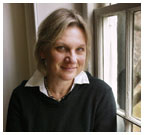
|
April 5, 2006: A moment with...
(Photo by Frank Wojciechowski) |
Pippa Green
As a Ferris Professor of Journalism this spring, Philippa “Pippa” Green is teaching undergraduates about the growth of the news media in new democracies. For the last two decades, she has participated in that process in her native South Africa, first as a print reporter in the turbulent last days of apartheid and more recently as the head of radio news at the South African Broadcasting Corp., where she programmed news and current affairs coverage for a national network that broadcasts in more than a dozen languages. Green spoke with PAW’s Brett Tomlinson.
What was the atmosphere for a young journalist in South Africa when you finished college in 1982?
The choices were about doing jobs that made a difference, in a society where there was so much injustice. There was no choice to do something that you enjoyed or could make money at. It just didn’t seem to be on the horizon of possibilities. It had be a job where you could make a tangible difference, and it did seem that in journalism, for all of the restrictions around the press and for all of the innate conservatism of the editors, you could tell some of the stories of the wrongs that were going on.
Was there direct interference from the government, or was it a matter of self-censorship by editors?
Even self-censorship is too strong a word, because it happens on every newspaper in the world if [the editors] have no self-awareness about the society and where they fit in. It happens on newspapers in the United States. You’ll hear people talk all the time about “my audience” or “my market” — “my audience is not interested in what happens in Harlem.” It’s the same phenomenon.
How did the media change when apartheid ended and the African National Congress came to power in the early 1990s?
[In addition to structural changes and new opportunities], there was a change at a political and emotional level, which is far more difficult to pinpoint. When we wrote during the apartheid years, there was a clear moral imperative.
There were clear good guys and bad guys. There was a clear enemy, and there was a clear job to do. After apartheid, [journalists] weren’t quite sure who they were supposed to be fighting, what they were supposed to be writing about. Some of them turned on the new government, as if all governments must be bad, and that sent the bristles up on the new government’s back. ... Sometimes I think that we as a professional group missed the real story of what was a revolution taking place in our backyard — that our eyes were closed to a huge social transition — the restructuring of the economy, of social conditions, of personal relations.
Your course this semester focuses on the role of the media in new democracies. In addition to South Africa, what countries do you find particularly interesting?
I think the United States is the most interesting example. America was a society born in revolution ... but the First Amendment was never really confirmed until the 1930s. People were locked up under what was called a seditious libel act or a criminal sedition act in World War I just for publishing pamphlets against the draft. So the censorship here, I think, was quite profound, although it was a censorship that was majoritarian, not imposed by a minority government. ... I think the big lesson is that just because something is on paper, you cannot take it for granted. The battle now is over the clamp on news at the source — the attempted restriction over so-called leaks — and it’s directly related to news about the war [in Iraq]. One always has to be vigilant.
What about media in places like Iraq and Afghanistan? Are they too fresh for one to take an analytical view?
I think so. Certainly, to be a journalist in Iraq, you don’t have a hell of a lot of freedom of expression at the moment. You can’t really do your job because you’ll get killed or kidnapped — and not only by one side. When I was at the SABC, [a South African] television reporter went to Iraq at the beginning of the war, and she filed quite a graphic piece when the American army, it seemed — I don’t know whether it was deliberate, I can’t imagine it wasn’t — attacked, with mortars, the hotel where they knew the journalists who weren’t in the embedded group were staying.
What are your impressions from your seminar so far?
I’m very impressed at the thoughtfulness of the students, the
way they absorb the literature, and the way they present themselves. One
thing that’s lacking in journalism, certainly in South Africa, is
the ability to absorb an intellectual breadth and then to convey it in
the form of a journalism that’s engaging. You can’t be boring,
but you have to be intelligent and assume that your readers, or your listeners,
or your viewers, are intelligent.
![]()

